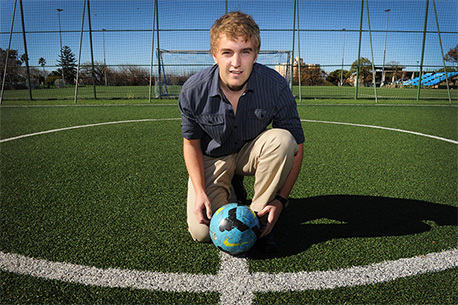Social cohesion a 2010 FIFA World Cup legacy?
04 July 2014 | Story by Newsroom
Nations unite, opposing fans embrace, rival players shake hands, and all is glorious under the floodlights.
The euphoria lasts around 90 minutes.
That's the average span of a soccer game, bar the stoppage time for fouls and injuries, or extra time if the match is drawn.
But do the promises surrounding social cohesion made by event stakeholders during the bidding process for mega-events actually materialise? Or are they mere memories?
These are questions commerce management studies student David Jenkins is aiming to answer in his master's dissertation.
In planning documents that bidders present to bodies like FIFA, social cohesion may be a harder deliverable to measure than job creation or infrastructure development. But it's a significant selling point to the public and a cornerstone of nation-building.
"This is true if you look at South Africa, considering the amount of hope that the country has invested in sport as a tool for social reconciliation, and the role it played previously in spearheading racial discrimination," Jenkins added.
"The 1995 Rugby World Cup was a great symbol of resistance to racial inequality and promoted sport as an avenue through which the government could restore the balance in South Africa as part of their reconstruction programme. With that came a new national flag and a new anthem."
Social cohesion was also a key imperative in the planning documentation for South Africa's bid for FIFA World Cup 2010.
Changes in sentiment
His study targets the media, "a strong reflector of public opinion and a platform that promotes accountability", and employs a new methodology in the form of media content analysis tool Leximancer, guided by Australian Michael Linley.
Leximancer identifies common words or phrases and groups them into a "word cloud". The software then forms paths between these words that identify the context within which concepts, like social cohesion, are being discussed. The programme is able to measure changes in the conversation surrounding social cohesion, as presented in the South African national press.
"It measures changes in sentiment in media articles and identifies associations with any related constructs that might influence or inform social cohesion," Jenkins explained.
Jenkins' study targets specific intervals: one and two years before the FIFA World Cup, the weeks during the event, and one and two years afterwards.
In 2010, social cohesiveness peaked when Bafana Bafana's Siphiwe Tshabalala scored the tournament's opening goal against Mexico, and continued when Bafana beat France in the group matches.
The media captured all those conversations.
"And if those conversations changed, I want to know how these changed," said Jenkins.
"The greatest challenge is to get your search terms correct so that you can separate off-field and on-field reporting."
Importantly, he is working within the parameters of CARNIVAL, an €850 000 European Union-funded joint study between the Cape Peninsula University of Technology, Coventry University, North Carolina State University, Universidade Federal do Rio de Janeiro and Technische Universität München.
Legacy is critical
The study will include an in-depth review of the event charters for Cape Town's failed 2004 Olympics bid, the FIFA World Cup 2006 in Germany, Rio de Janeiro's 2016 Olympics bid, and England's bid for the 2015 Rugby World Cup, among others.
"The EU project looks at impact assessment: the legacies and failed legacies and why they aren't being delivered and how they can be managed," said Jenkins.
His research will ultimately contribute to the findings of this project, which will inform event stakeholders in the bidding for mega-events.
Given the astronomical price-tag attached to these mega events, legacy is critical.
The recent riots in Brazil, the most violent in that country's history, have been fuelled by poverty and socio-economic needs and have all but eclipsed the soccer.
The writing is on the wall, he says.
"Bidders will need formal proof of legacy to be able to bid successfully for events."
(Jenkins won the best paper award at the 2nd International Student Conference in Tourism Research (ISCONTOUR 2014), held at the IMC University of Applied Sciences Krems, Austria, in May. The paper is titled: Harnessing the Power of Football: Safety-risk perceptions of sport tourists at the 2013 FIFA Confederations Cup in Brazil. His UCT supervisor is Associate Professor Richard George who he says has "contributed greatly in facilitating the unique demands of my master's".)
Story by Helen Swingler. Image by Michael Hammond.
 This work is licensed under a Creative Commons Attribution-NoDerivatives 4.0 International License.
This work is licensed under a Creative Commons Attribution-NoDerivatives 4.0 International License.
Please view the republishing articles page for more information.










